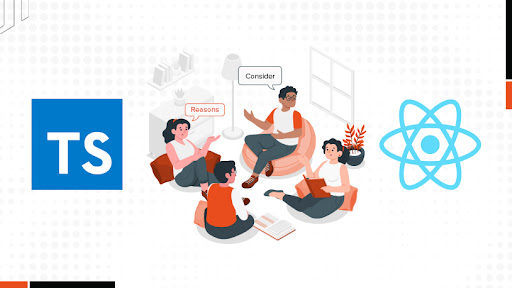Want to know the benefits of using TypeScript with React? If yes then you have landed on the right page. Here’s a comprehensive guide that will help you understand every reason in detail.
TypeScript (TS) has eventually revolutionised the development of large applications and gained immersive popularity. It offers enhanced maintainability, code consistency, and future browser support, which are a few reasons why most front-end developers prefer it over JavaScript. It is essential to understand the concept before diving into its benefits.
Top 4 Reasons You Must Consider TypeScript with React
Let us discuss the top reasons why you must consider using it with React applications:
-
Easy to Read and Define Components
TypeScript enables the developers to effortlessly; define Prop types and makes the code easier to read and comprehend.
It allows you to seamlessly define multiple components and fix them the way you want. Powered by IntelliSense support (the intelligent code completion feature) and static type checking, you will be able to experience incredible development and reduce potential bugs.
Further, assigning comments to Prop types enhances readability when you check a component definition.
-
Improved team performance
One of the most prominent advantages of using strictly typed programming languages is that they eliminate too much dependency of your developers on other team members, allowing them to focus more on their work.
Context switching and asking regular questions can affect the performance of your developers and cause hindrance in the timely submission of projects.
Hence, when your developers get enough time to code, the efficiency of your organisation increases significantly.
-
Compile-Time Validation
One of the most significant issues while working with PropTypes is that they operate during runtime. The longer it takes to build codes, the more you need to wait to get the type-checking feedback.
TypeScript acknowledges what’s wrong with your code before running your program. As mentioned earlier, you can define complex type definitions in TS using its diverse interfaces. You don’t need to worry about committing errors in the code as it will notify you about the same.
You can make use of interfaces in TypeScript right away and use them for props and state definitions. Further, its compilator will ensure all the necessary properties of the component.
-
Advanced Tools
TypeScript provides you with some advanced tools as compared to JavaScript. You will be amazed by enhanced autocomplete, refactoring, and snippet generation options.
The credit goes to Intellisense, which enables you to index code with a static type system of TS. You will notice different options mirroring on your screen once you start typing here. These features are most effective when one commences writing TypeScript code, especially in Visual Studio Code.
It also helps novice developers by offering suggestions like what props are required, etc. Moreover, refactoring is also convenient with TS in opposition to JavaScript.
Winding-Up
We hope this extensive guide helped you understand why you must opt for TypeScript over JavaScript for React applications. It effectively increases the efficiency of your developers, and you can meet project deadlines on time. Moreover, it provides additional tools which help you get the best out of your developers.
Are you facing issues with your online store’s performance? We at magePoint are here to help with a dedicated team of React developers who know how to enhance your website and possess proficient knowledge & skills.
Contact us today to get expert assistance.



